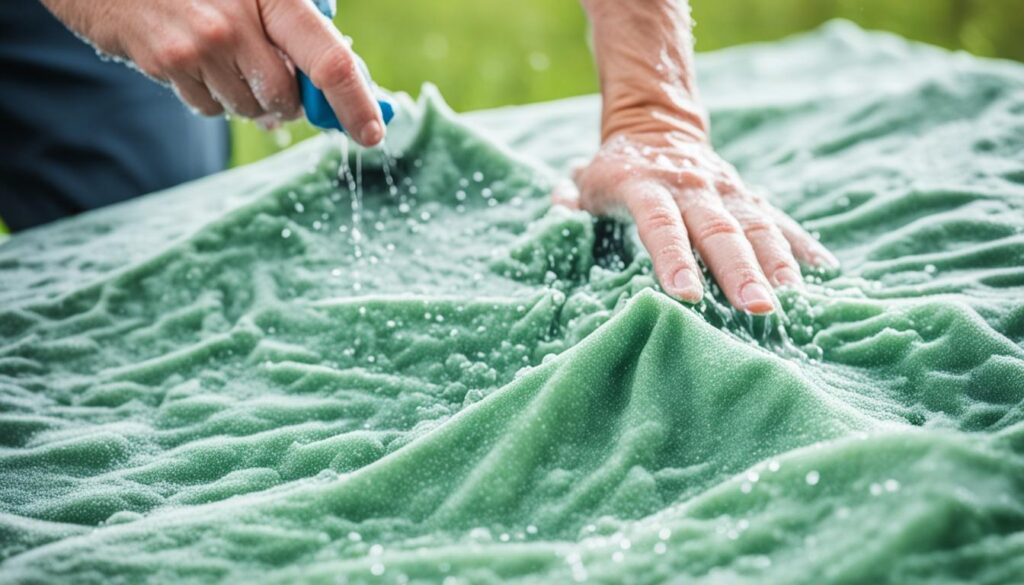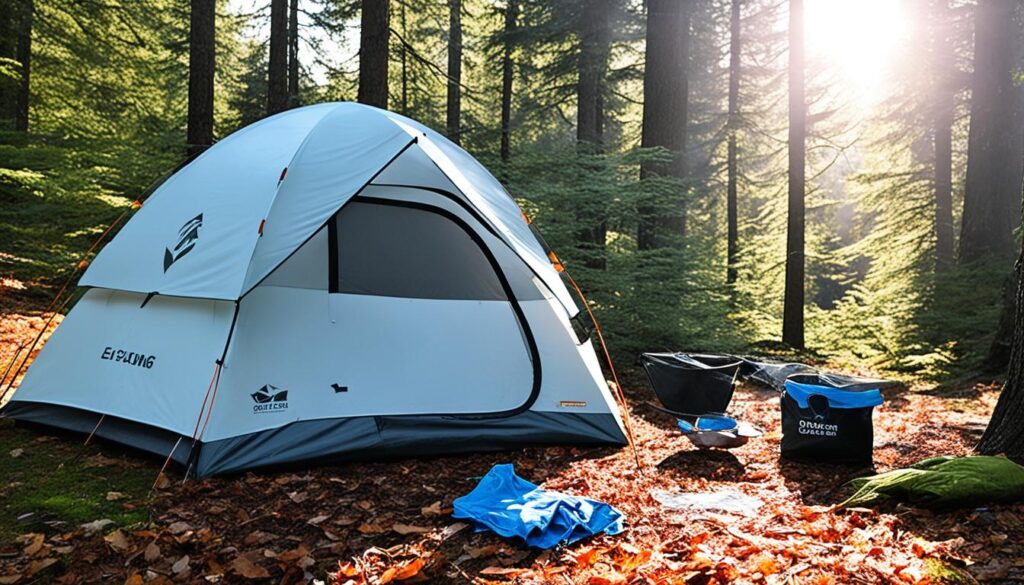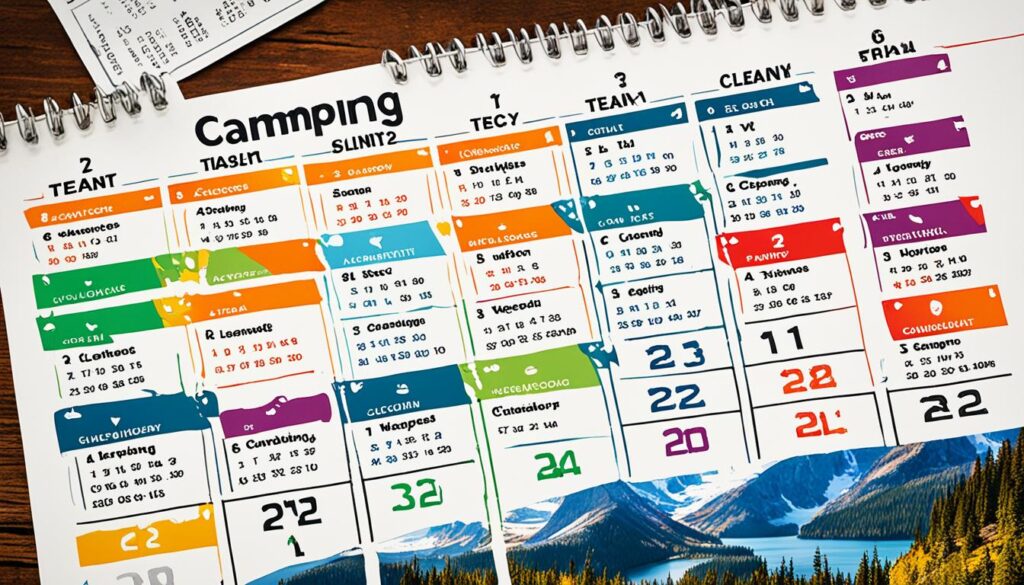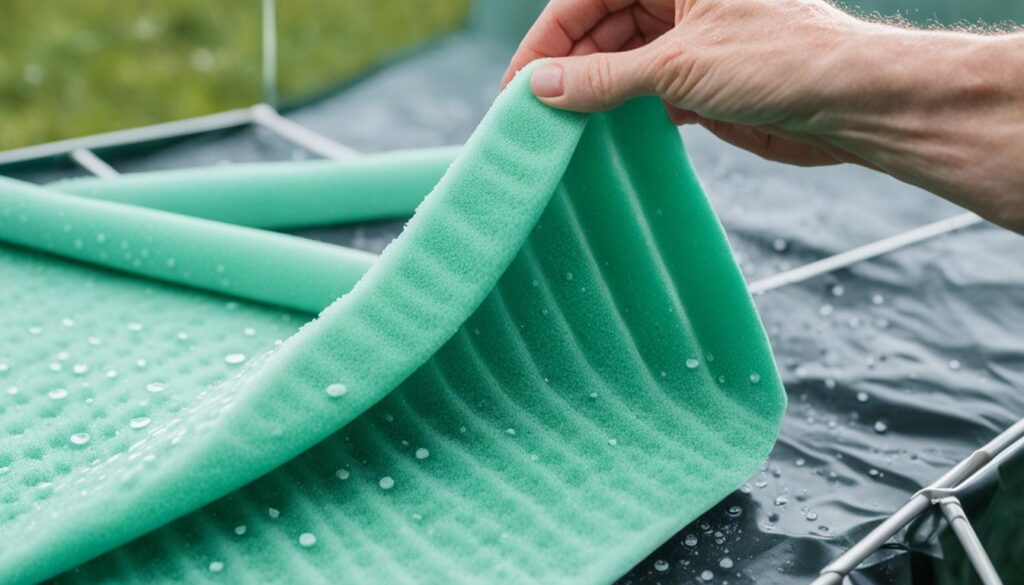Proper tent care is essential to ensure your gear stays in top condition for years to come. Cleaning your tent after camping is an important part of tent maintenance. By following these simple tips, you can easily and effectively clean your tent, preserving its performance and longevity.
Key Takeaways:
- Regularly cleaning your tent is crucial for preserving its material and preventing mold and mildew growth.
- Use a sponge with non-detergent mild soap and warm water to clean your tent, and avoid using washing machines or tumble dryers.
- Take care of zips by using a brush and lubricant, and be gentle when rinsing your tent with a hose to avoid damaging the seams.
- Dry your tent thoroughly before storing it in a cool, dry place away from sunlight.
- Cleaning your tent after camping in harsh conditions, visible dirt or stains, and before big trips or seasonal storage is recommended.
Contents
How to Clean a Tent After Camping
Properly cleaning your tent after a camping trip is essential to ensure its longevity and maintain its performance. Follow these tent cleaning techniques and hacks to keep your gear in the best condition.
1. Lay It Out Flat
Start by laying your tent flat on a clean surface. This will make the cleaning process easier and more effective.
2. Use Mild Soap and Warm Water
Fill a bucket or basin with clean, warm water and add a non-detergent mild soap. Gently sponge down the tent, focusing on areas with visible dirt or stains. Avoid using harsh detergents, as they can damage the tent fabric.
3. Avoid Machine Washing and Tumble Drying
Never machine wash or tumble dry your tent, as this can weaken the fabric and damage any waterproof coatings. Instead, hand wash it with care.
4. Take Care of the Zips
Use a soft brush to remove dirt and debris from the zips. Apply a small amount of lubricant to keep them running smoothly. This will prevent zipper damage and ensure easy opening and closing.
5. Opt for Mild Detergents and Tech Washes
When choosing a cleaning agent, mild detergents or specific tech washes designed for outdoor gear are the best options. These products effectively remove dirt and grime without compromising the tent’s waterproof properties.
6. Rinse with a Gentle Hose Spray
After cleaning, rinse your tent gently with a hose spray. Be cautious not to apply too much pressure, as it can potentially damage the tent’s seams. Ensure that all soap residue is thoroughly washed off.
7. Dry Thoroughly and Properly
Allow your tent to dry completely before packing it away. Hang it up or set it up in a well-ventilated area away from direct sunlight. This will prevent mildew buildup and maintain the tent’s freshness.
8. Store in a Cool, Dry Place
Store your clean and dry tent in a cool, dry place, such as a basement or closet. Avoid storing it in hot or humid areas, as this can promote mold growth and degrade the fabric over time.
By following these tent cleaning techniques and hacks, you can ensure that your tent remains clean, fresh, and ready for your next camping adventure.

| Tent Cleaning Solutions | Pros | Cons |
|---|---|---|
| Mild soap and warm water | – Gentle on the tent fabric – Easy to find and use | – May require more scrubbing for tough stains |
| Tech wash | – Specifically designed for outdoor gear – Removes dirt and grime effectively | – Can be more expensive than mild soap |
| Vinegar and water solution | – Natural and eco-friendly – Helps remove odors | – May not remove tough stains as effectively |
| Baking soda paste | – Excellent for removing stains – Non-toxic and safe | – Requires more effort and scrubbing |
| Lemon juice and water solution | – Natural and eco-friendly – Helps remove mold and mildew | – May not be as effective on tough stains |
Why You Should Clean Your Tent Regularly
Regularly cleaning your tent is crucial for maintaining its durability and ensuring a pleasant camping experience. By cleaning your tent on a regular basis, you can:
- Preserve the material: Regular cleaning removes accumulated dirt and particles that can cause premature wear and tear, helping to extend the lifespan of your tent.
- Prevent mold and mildew growth: Cleaning your tent removes moisture and prevents the growth of mold and mildew, which can weaken the fabric and cause unpleasant odors.
- Maintain functionality and performance: Cleaning your tent keeps zippers, seams, and ventilation systems free from dirt and debris, ensuring optimal functionality and performance.
- Preserve waterproof qualities: Regular cleaning helps to maintain the waterproof qualities of your tent, keeping you dry and protected from the elements.
So, make it a habit to clean your tent regularly to ensure its longevity and to have a more enjoyable camping experience.

Remember, prevention is key when it comes to tent maintenance. Regular cleaning and proper care can help prevent issues such as mold and mildew, which can have a lasting impact on the lifespan and usability of your tent.
Expert Tip:
“I recommend setting a cleaning schedule for your tent, depending on how often you use it and the conditions you camp in. It’s better to clean your tent more frequently if you use it in harsh or dirty environments. This way, you can maintain its performance and durability for years to come.” – Outdoor Gear Expert, Bearfoot Theory.
Next, let’s explore when you should clean your tent to ensure optimal maintenance and cleanliness.
When to Clean Your Tent
Knowing when to clean your tent is essential for its maintenance. By following a tent cleaning schedule, you can ensure that your tent remains in optimal condition for all your camping adventures. Here are some key factors to consider:
- Clean after camping in harsh conditions:
- Long-term use:
- Storing for extended periods:
- Visible dirt, stains, spills, odors, and mustiness:
- Before a big trip or on a seasonal basis:
After camping in rainstorms, dusty areas, or near the beach where sand and saltwater can cling to the fabric, it’s important to clean your tent. These conditions can leave residue and potentially damage the material if not properly removed.
If you’ve been using your tent for an extended period of time, it’s a good idea to give it a thorough cleaning. Regular use can lead to the accumulation of dirt and stains that may impact the tent’s performance and lifespan.
Before storing your tent for a prolonged period, make sure to clean it. Even if it appears clean on the surface, there may be hidden dirt or moisture that could lead to mold or mildew.
If you notice any visible signs of dirt, stains, accidental spills, unpleasant odors, or mustiness, it’s time to clean your tent. These issues can affect the functionality and enjoyment of your camping experience.
Cleaning your tent before a big camping trip or on a seasonal basis is a good practice. It ensures that your tent is fresh, clean, and ready for your next adventure.
Tent Cleaning Timing and Frequency
The timing and frequency of tent cleaning depend on various factors, including how often you use your tent and the specific conditions in which you camp. Consider developing a tent cleaning schedule based on your camping habits, taking into account the recommendations mentioned above. This will help you maintain your tent’s cleanliness and prolong its lifespan.
Remember, a clean tent not only looks better but also performs better, providing you with a comfortable and enjoyable camping experience.

Tent Care, Maintenance, and Repair
Proper care, maintenance, and repair are crucial for maximizing the lifespan of your tent. By following these tent care tips, you can ensure that your tent remains in optimal condition for many camping adventures to come.
During setup at the campsite, it’s important to choose a flat spot and use a tent footprint to protect the bottom of your tent. This simple step can help prevent damage from rocks or sharp objects on the ground. Additionally, avoiding wearing shoes inside the tent and keeping dirty gear outside can help minimize dirt and debris inside the tent, reducing the need for frequent cleaning.
Properly storing your tent after camping is equally important. Shake out any dirt or debris, remove the tent poles, and allow the tent to thoroughly dry before packing it away. Storing your tent in a cool, dry place away from sunlight can help preserve its durability and prevent mold or mildew growth.
In addition to regular cleaning, knowing how to repair your tent is essential. If you notice zipper tracks that are not functioning properly, you can often fix them with a bit of zipper lubricant or by gently realigning the teeth. Seam sealer can be used to reinforce the seams and prevent water leakage. By taking the time to repair minor damages, you can extend the lifespan of your tent and ensure it remains durable and reliable.
FAQ
How should I clean my tent after camping?
To clean your tent, lay it out flat and use a sponge with non-detergent mild soap in clean, warm water. Avoid using a washing machine or tumble dryer, as well as car washes. Take care of the zips by using a brush and a small amount of lubricant. Mild detergents and specific tech washes are the best options for tent cleaning. You can use a hose to rinse down your tent, but be gentle to avoid putting holes in the seams. It’s vital to dry your tent thoroughly to prevent mildew build-up and store it in a cool, dry place away from sunlight.
Why should I clean my tent regularly?
Regularly cleaning your tent is crucial for several reasons. It helps preserve the material by removing accumulated dirt and particles that can cause premature wear and tear. It also prevents mold and mildew growth, which can weaken the tent fabric and lead to unpleasant odors. Cleaning your tent maintains its functionality and performance by keeping zippers, seams, and ventilation systems free from dirt and debris. Additionally, regular cleaning helps preserve the tent’s waterproof qualities and ensures a more pleasurable camping experience.
When should I clean my tent?
Knowing when to clean your tent is essential for its maintenance. It’s recommended to clean your tent after camping in harsh conditions, such as rainstorms, dusty areas, or near the beach where sand and saltwater can cling to the fabric. Long-term use and storing for extended periods also warrant a thorough cleaning. Visible dirt, stains, accidental spills, odors, and mustiness are other signs that your tent needs cleaning. Additionally, cleaning your tent before a big trip or on a seasonal basis is good practice.
How do I take care of my tent to maximize its lifespan?
Proper care, maintenance, and repair are crucial for maximizing the lifespan of your tent. Taking care of your tent during setup at the campsite, such as choosing a flat spot and using a footprint to protect the bottom, helps prevent damage. During your camping trip, avoid wearing shoes inside the tent, keep dirty gear outside, and be mindful of zippers and ventilation. Properly storing your tent after camping, including shaking out dirt, removing poles, and ensuring thorough drying, is essential. Regular cleaning and avoiding mold growth are important maintenance steps. Finally, knowing when and how to repair your tent, such as fixing zipper tracks or using seam sealer, helps maintain its durability.






